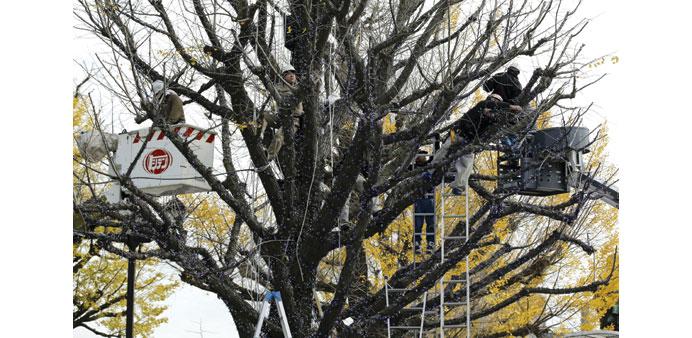Workers climb a tree to decorate it with Christmas lights at a park in Tokyo. Japan’s government hopes that raising the minimum wage will ‘trickle up’ into a broader rise in pay and consumption, but the smaller businesses who account for most Japanese jobs are in no shape to square that virtuous circle.
Reuters
Tokyo
Japan’s government hopes that raising the minimum wage will ‘trickle up’ into a broader rise in pay and consumption, but the smaller businesses who account for most Japanese jobs are in no shape to square that virtuous circle.
Since taking office in late 2012 Prime Minister Shinzo Abe has badgered companies to raise wages to help end decades of deflation and stagnant growth, but only the largest employers have responded. Last month he took matters into his own hands, pledging to raise the minimum wage by about 3% a year for the next five years or more.
Big companies raised wages an average 1.8% in 2013, 2.3% in 2014 and 2.5% this year, the Keidanren business lobby said.
Government data shows that has not filtered down to the 65% of people who work at small and medium-sized enterprises (SMEs), where wages fell 0.4% in 2013 and rose only 0.4% last year.
Economists say that is because many SMEs are unprofitable “zombies” kept alive by cheap financing.
Around 70% of companies that filed taxes in fiscal 2013 booked a loss, according to the most recent data, and profit growth even among SMEs that do make money is slowing.
“Big companies are raising wages, but SMEs are falling behind because they cannot keep up with labour costs,” said Hiromasa Matsuura, economist at Mizuho Research Institute.
“It is possible this policy could push up unemployment.”
On the face of it, Abe’s plans appear modest; the national average minimum wage is 798 yen per hour – the same as in the US but around 20% less than in Britain and only half as much in France, OECD data show.
He wants to raise it to 1,000 yen in about five years, which implies a 3% increase each year.
Only about 3% of the employed earned the minimum wage last year, so the number affected initially looks small, but a further 6% are hovering ¥40 or less above that level. And as it increases 3% every year, still more will be brought within range.
Toshikazu Funakubo, president of Showa Seisakusho Co, a maker of precision parts for cars, turbines and medical devices, says that could make things tough for many companies.
“Eventually, the atmosphere could change, and more companies could start looking for ways to keep their wage bill down,” he said from a plant in a gritty factory district on Tokyo’s south side.
The initial economic rewards for the policy appear negligible against such risks.
The government estimates a 3% minimum wage hike could add ¥70bn to ¥90bn to wages, but that is at best only a 0.04% boost to Japan’s total wage bill of around ¥210tn.
Economists say that is a sideshow to Japan’s real structural obstacles to growth, like its shrinking working-age population, which has been in decline since the mid-1990s.
“Raising the minimum wage is OK, but this is second tier compared to the real issue of demographics,” said Masamichi Adachi, senior economist at JP Morgan Securities.
“The measures the government is pushing to promote growth are not sufficient.”
The opposition Democratic Party of Japan (DPJ) floated a similar plan to push the minimum wage to ¥1,000 when it was in power from 2009 to 2012, but abandoned it in the face of stagnant growth.
This time, the timing is more propitious, given a tight labour market and unemployment at a 20-year low of 3.1%.
But that in part reflects the strength of Japan’s biggest companies, the top exporters, who have benefited from monetary easing policies that have weakened the yen.
But at the other end of the scale, where companies fear Japan’s declining population will weaken domestic demand, a higher minimum wage could have unintended consequences.
“We would all be lucky to get higher pay, but my company would find a way of making us pay more out of our own pockets by reducing benefits,” said Yumiko Tanaka, 36, a receptionist at a rental office who earns Tokyo’s minimum wage of ¥907 ($7.38) per hour, which would buy a bowl of ramen noodles.
“It’s tough when you work as a contractor. Any time you ask for better benefits you are pressured into quitting.”

